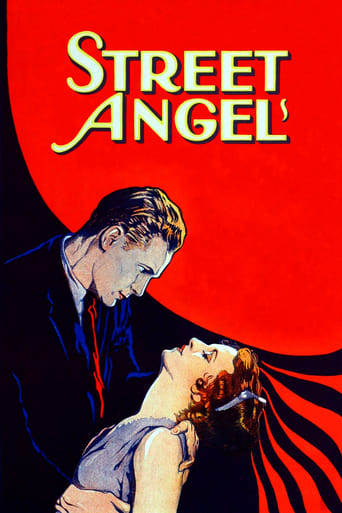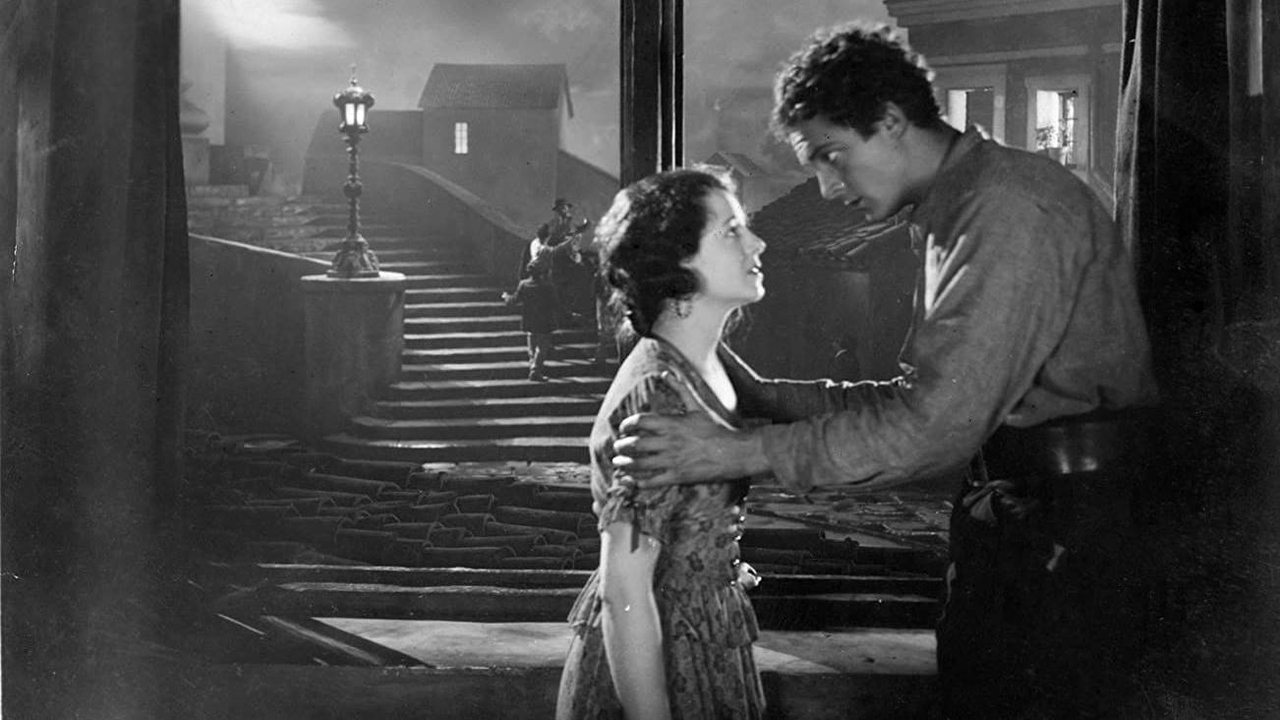lshelhamer
Another pairing of Janet Gaynor and Charles Farrell that could have been right out of Puccini. Farrell is not as his best as an improbably naive itinerant painter. Gaynor comes off somewhat better as a circus performer with an illicit past, who initially rejects all men and love, but then predictably falls in love with the painter's idealism and optimism. The sets are wonderful, also operatic in atmosphere, especially in the street scenes. There is an excruciatingly long goodbye scene where, unbeknownst to Farrell, Gaynor must leave him to pay her debt to society. Yet the movie could have been saved if it ended with the melodramatic scene with Farrell, finally learning the truth, choking Gaynor in a side altar of a church, under the picture of her he had painted previously. The Madonna symbolism is pretty obvious. Unfortunately, in literally the last five minutes, a happy ending destroys the entire spirit of the movie.
mozartman2000
It's a moody and often expressionistic film like Gaynor's "Sunrise" (1927)...which I consider far superior in technique and story. Two things I find VERY DISTURBING about "Street Angel" --(1) She asks the cop for 'one little hour' with her fiancé' before going to jail, but she went to jail right after her mom died without burying her or explaining to the cops or the judge. (2) She does not explain to her fiancé' why she's going away and, after she gets out, does not try and explain either. For this reason, I do not find Gaynor's character very appealing or sympathetic at all. She's definitely no "angel" in this movie. I feel sorry for the painter guy. The film's only redeeming qualities are the scenes inside their apartment which are tenderly and exquisite.
mgmax
SPOILER NOTE: this contains spoilers about Street Angel and its predecessor, Seventh Heaven.Seventh Heaven is somewhere in the middle of the pack of silent films that are still seen today, but in its day it was a huge success, and it's no mystery why. With World War I less than a decade behind it, Seventh Heaven (1927) offered shameless fulfillment of one of the most persistent fantasies of the war-- that your loved one, believed dead, will rise and come back to you if you just wish for it with all your heart. The film is mainly remembered as a proletarian Parisian romance between the sewer-worker Chico (Charles Farrell) and the waif Diane (Janet Gaynor), set on a visually active representation of a Paris neighborhood in which the stars and the camera are always roaming over stairs and rooftops, but the last act and climax are driven by the war and by Diane's wishing that her beloved will come back to her which, struggling against great odds (including having been blinded), he does in a scene of sentimentality rendered with the kind of no-holds-barred brio that only the silent cinema, with its booming organs and dreamlike absorption, could achieve. Not surprisingly, Street Angel was an attempt to make lightning strike twice with the same stars and director in another tale of lovers parted by circumstances bigger than themselves-- a theme Borzage would continue to explore not only in the third of his Gaynor-Farrell silents, Lucky Star, but throughout the 1930s in such films as Man's Castle (in which it's the Depression), History Is Made at Night (a Titanic-like shipwreck), and Three Comrades (the rise of Nazism). Gaynor plays another waif driven, in desperation, to prostitution (quite frankly portrayed); arrested for theft while soliciting before she actually has to do anything sordid, she escapes with a circus, meets painter Farrell, they fall rapturously in love-- and then a policeman remembers where he's seen her. She goes away in secret rather than let Farrell know her shame, but alas, he turns to drink in disappointment at the perfidy of women, and in the big climax, it is not that he must crawl back to her from the dead, but that she must convince him of her purity before he does what a man's gotta do. Using a similar moving camera on a stage set-like cityscape, but with lighting far more influenced by German Expressionism than Seventh Heaven (the result of following Sunrise in production at Fox, no doubt), Street Angel is visually impressive but the plot, and the attitudes that underlie it, are repugnant-- it's one thing for a young couple to be torn apart by war, it's another to be torn apart by your own sanctimony. And part of the reason we may find it unappealing is because we're not swept away by Farrell's character in this tale-- it's the kind of role that, if it didn't kill his career outright, certainly helped type him as a relic of the more florid silent era as sound progressed. One of the truisms of movies is that men happily in love are unwatchable dopes. Happy couples are in general undramatic, to be interesting there needs to be some form of conflict before you find happiness in the fadeout (your two families are feuding; you're fighting like cats and dogs on the Twentieth Century; your elderly father has hired a private detective to keep you and your sister out of trouble). But the man in particular stands a high chance of looking like a big emasculated idiot if he just spends the movie gooning at his gal. Borzage's Man's Castle (1932) shows how to do this right-- Spencer Tracy does manly stuff out in the world to try to get by, while Loretta Young tries to make them a happy home on no money. Street Angel does it all wrong-- Farrell, who has a strapping physique and handsome face but a little pursed mouth, just stares and moons at Gaynor like a lovesick beagle, which means we already can't stand him by the time he turns out to be a moralistic jerk-slash-pretentious-artiste. (It doesn't help that the early soundtrack breaks into either whistling or saccharine serenading on a regular basis. I guess we can be grateful that no one yodels.)Film fans may find delights in Borzage's photography and in Gaynor's more appealing performance as the long-suffering gal, but today at least, Street Angel proves to be the least appealing of the "trilogy" next to Seventh Heaven or Lucky Star.
silent-12
This film was a follow up to 1927's "7th Heaven", starring Farrell and Gaynor, and in my opinion, this film is even better. The Farrell-Gaynor chemistry is so potent that at times (especially when they're dining together in his little apartment) you feel as if you're intruding. The last scene, where Charles is chasing Janet through the fog, is moody, atmospheric--Borzage at his best. An exquisite film.


 AD
AD



